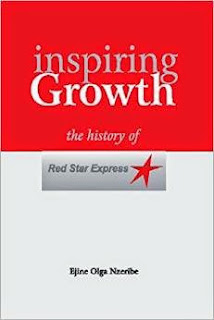If all the qualitative attributes check the box, then price would be in such astronomical multiples, that would make it hard to choose between a very prosaic commodity business at significantly cheaper multiples versus a high quality business at 60 times earnings.
In frothy times that we are in, it is easy to imitate the lemmings and drop the standards and stay out of the market. Or one could venture into frontier markets which is what I have chosen, and play the mis-calculated game of high uncertainty in politically troubled countries with a few bargains.
We are invested in Nigeria in an outstanding company called Red Star Express. An ex-employee has written a book which is a must read for every potential business man, or investor in Nigeria.
http://www.amazon.com/Inspiring-Growth-History-Star-Express/dp/1494886618
Unfortunately the book is only available in paper copy, and I forgot the book in India during recent travel, with all important ideas highlighted or dog-eared.
One of the most important idea is that running business in Nigeria without a 10-15 year plan will send you back packing home penniless. That is the fate of most Multinationals. Running business in Nigeria is like being a Politician cum Finance Minister of a small country with CEO responsibilities added in. You have to secure your own fuel, ensure own power generation, ensure safety of employees, have transport fleet on cratered roads, and much more.
In the United States UPS (90 Billion USD) and FEDEX (50 Billion USD) punched so hard at DHL ( 50 Billion USD), forced it bleed 9 Billion dollars by 2008 before the company pulled plug. That is right 9 with B. That is the power of network effect ! that a mega 50 Billion USD company could not make a dent. Courier networks, planes in conjunction with value added logistics and support services are one of the hardest to assail economic forts.
Imagine establishing a network in a country (Nigeria) where your courier delivery boys could be killed on the streets. Red Star Express has lost a few to Boko Haram. The company founded by ex-DHL employees in 1990s, turned the game back on DHL, hired the brightest, paid 2X the salary, established strongest brand in the industry. The list of innovation and failures goes on that allowed the company to compound @ 68% in revenues over a period of 15 years such as incentive for employee to buyback the vehicle used for delivery, to minimize repairs. The spirit of camaraderia and teamwork has been unmatched. The book is a packed thriller with tragic challenges that threatened the very survival of the company and eventual triumph in any entrepreneurs life. While DHL publicly does not speak about market share. I can tell you that DHL Nigeria has 800 employees and Red Star Express has close to 1700 associates. DHL Nigeria is much weaker in domestic business and dominates in export/import. Other competitors are UPS (also formed by acquisition of local company), TNT and local companies.
In the recent year when GSK, Nestle, Unilever, Cadbury in Nigeria either suffered losses or major revenue shrinkage, understandably due to violence in Nigeria, Boko Haram etc, Red Star has kept its profitability intact. We think very highly of the company and its management.
Red Star is the franchisee of FedEx which is among the highest barriers-to-entry businesses anywhere in the world, and we believe that “moat” will be much wider/deeper in future. Courier is less likely to be price regulated compared to other high barriers-to-entry oligopoly network industries such as rail, gas, electricity.
We love the tough on ground economic environment in Nigeria and we adore the 22%ROE, 6% dividend yield and 6PE ratio that the share trades at. We believe this is the stuff that 20, 30 or 50 baggers are made of. Nigerian entrepreneurs on the whole are responsible for low levels of corporate governance and the multiples. We expect the company which has not missed a dividend in decade to be an aberration and at par with MNCs and expect sharp re-rating.
It may take a while but the bloody headlines will eventually change for Nigeria. There is a lot of room for positive surprises ! We expect a very remarkable performance in revenue growth and significantly more in share price than revenue growth over the coming decade. Courier business, logistics, internet penetration, portals, online shopping are at similar levels of maturity as India and are ripe for an exponential take off.
In my opinion the challenge will not come from any MNCs, it cannot, its another Vietnam jungle battle for a Western CEO, given that CEO’s role is that of a Prime Minister, but the local Amazons of Nigeria, ( KONGA, JUMIA which are their Flipkarts) setting up their own courier business could challenge the exponential growth that I envisage.




